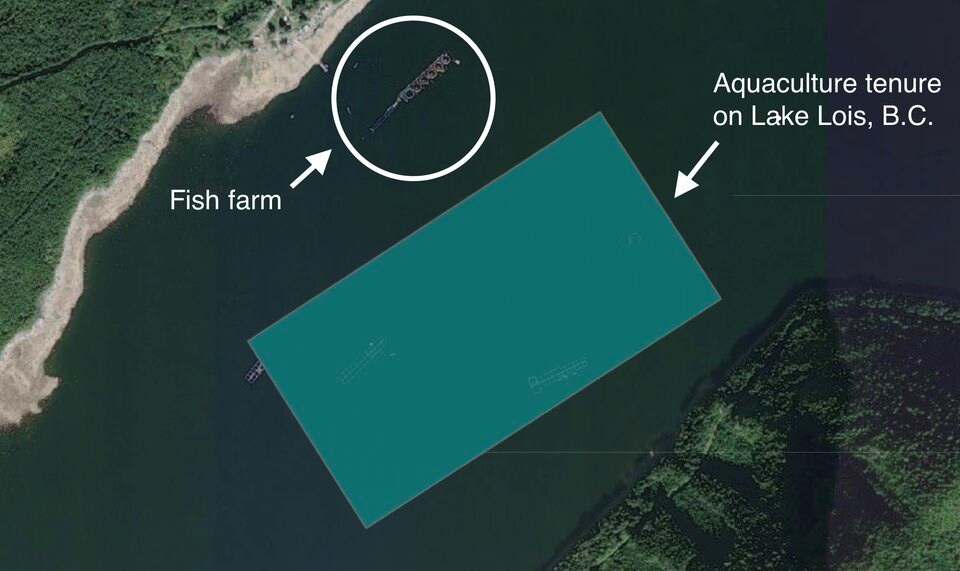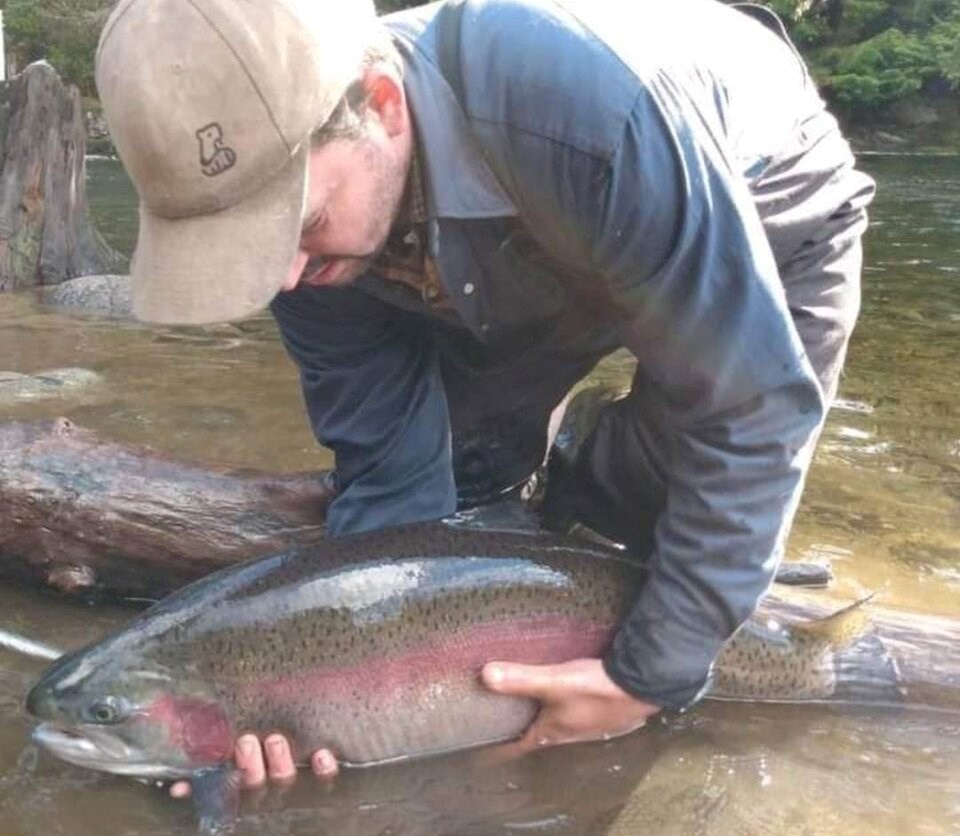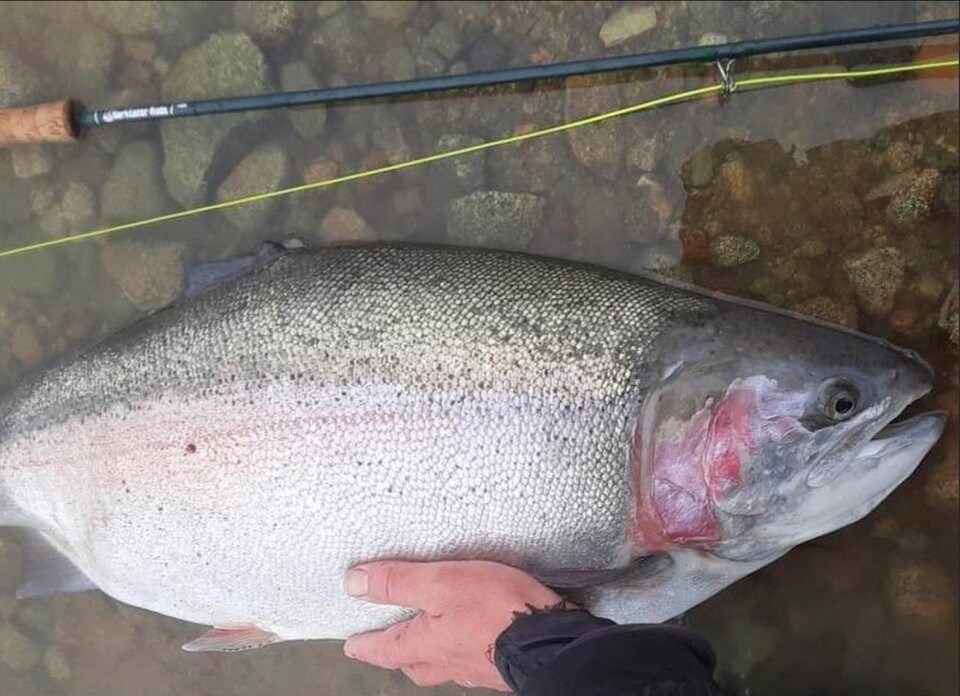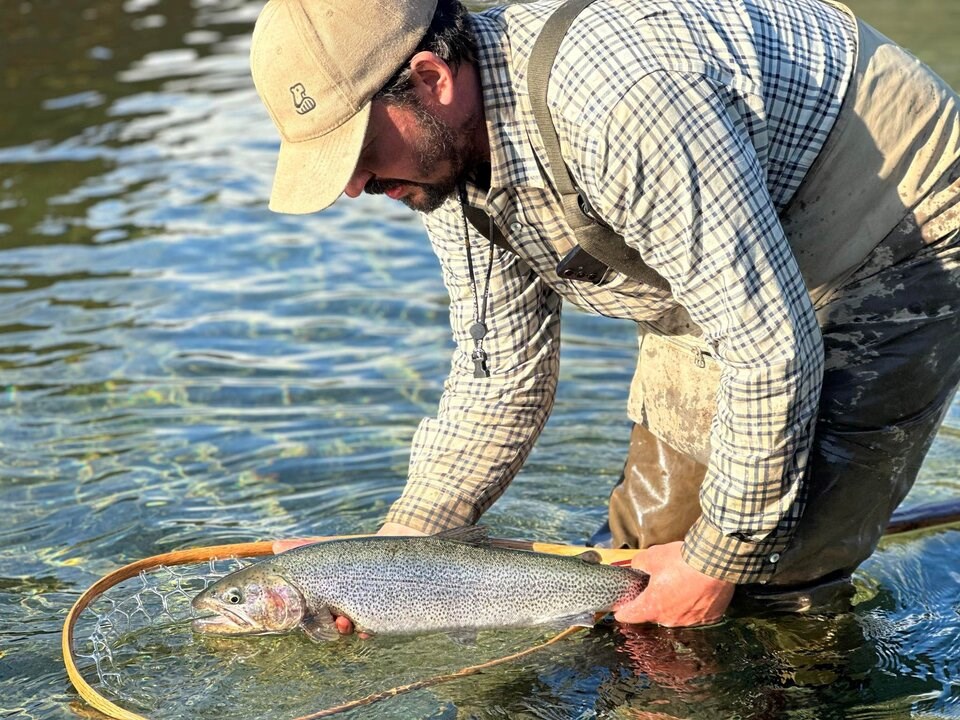A fish farm that illegally set up operations outside of its provincial tenure has been given a chance to amend its licence so it can continue operating, a spokesperson for the B.C. Ministry of Forests has confirmed.
According to a provincial database, the B.C. Ministry of Forests granted a licence tenure to a West Coast Fishculture (Lois Lake) Ltd. facility to farm “fin fish” on Lake Lois, a body of water about 15 kilometres east of Powell River.
But satellite imagery collected by the province, a spokesperson for the ministry, and a local fishing guide all confirm the company has been operating out of its legal boundaries. Fishing guide Pat Demeester, who has been watching the fish farm on the lake for the past two decades, says despite the investigations, the farm continues to operate.
“They sold fish this morning. They drove down with big tubs,” Demeester said last week.
“There’s dozens and dozens of infractions here. They’re so up shit’s creek right now.”

Agrimarine, which owns and operates trout and salmon farms in British Columbia and China, bought West Coast Fishculture (Lois Lake) Ltd. in 2013. Glacier Media reached out to the company, but several emails bounced back and phone calls went answered. As of Wednesday, the company's listed website also appeared to be down.
Demeester says the operators of the farm have so far escaped penalties despite dumping fish farm waste — largely fish faeces — and one time, 20,000 genetically modified fish into the lake. The incident prompted fisheries officers from Fisheries and Oceans Canada to raid the location in 2021, said the fishing guide.
A spokesperson for the ministry confirmed a DFO investigation was underway due to escapement of farmed fish, though according to emails seen by Glacier Media, those charges have not yet been made public.
At the provincial level, the Conservation Officer Service and staff in the Ministry of Environment’s Compliance and Enforcement Branch are also jointly investigating waste discharges connected to the Lake Lois aquaculture operation, a spokesperson for the Ministry of Forests said.
“As this investigation is ongoing, it would be inappropriate to comment further,” said the spokesperson.
Province threatens fines amid multiple investigations
A Jan. 17, 2023, provincial inspection report revealed the fish farm was pumping out over 1.7 million kilograms of trout a year — more than 1,100 times more than its licence permits. Effluent coming off the farm was also found to exceed multiple limits, including high concentrations of phosphorous.
The report warns the company it could face up to $75,000 in fines if it didn’t come into compliance.
To manage the large volume of fish, Demeester says the company has installed hundreds of feet of pipe to blow fish and feed from the lake shore to the floating fish tanks.
“It’s like a guy going into a clearcut, putting up fences and raising pigs on Crown land with no licence,” he said.
Demeester says he has written two letters to the federal government since the DFO raid, warning them the farm continues to operate outside of its tenure. But so far, he says the farm remains in operation.
The ministry spokesperson said that the province directed the company apply for an amendment to its licence after it found out it was operating outside of the approved boundaries. That amendment was received in November 2022 and is currently under review.
“In this specific situation, ministry experts deemed it appropriate to request that the proponent work to come into compliance by submitting a tenure amendment application,” said the spokesperson.
‘Nature found a way’
In recent years, Demeester says the company has been rearing a hybridized rainbow trout from Washington state. He says 85 per cent of them are not sexually viable once they mature.
“It shouldn’t be an issue because they should kill them first,” he said. “But they’ve been losing them on a day-to-day basis for 20 years.”
Some of the trout Demeester has found had the mandatory clipped tail that identifies them as hybrid, farm-raised trout. But others, says the guide, have escaped without the tell-tale marking, proliferating across the lake and eating up the kokanee, sculpin and other small fish native cutthroat trout survive on.
Demeester says he has collaborated with biologists to track the population over several years, eventually finding the hybridized fish was spawning new generations and growing to immense sizes.
“‘I was like, ‘Oh my god, nature found a way. They are populating the lake,’” he said. “I had a client that just pulled a 30 pound rainbow. It got to 30 pounds eating the food for sculpin, stickleback and more importantly kokanee.”
“It’s unbelievable.”

After one of the semi-enclosed fibreglass tanks tipped over dumping tens of thousands of the hybrid fish into the lake and prompting the 2021 DFO raid, the hybrid rainbow populations have exploded, said the guide.
And because many of the fish don’t have a clipped tail, Demeester says they are protected and can’t be fished from the lake.
“We’re going to dealing with these guys for 10 years until they die off,” he said.
In the meantime, the guide says he’s worried the hybridized trout will continue to devastate the lake’s sensitive ecosystem, leaving little food for local fish.
“We’ve never had a hybridized fish escape like this,” he said. “When you hybridize it, all it wants to do is eat, eat eat.”
“If anything happens to kokanee, we’re going to lose these cutthroat.”

Lois Lake trout sold under Ocean Wise label
According to a run by Ocean Wise, the seafood sustainability label continues to recommend the Lois Lake rainbow trout — also known as steelhead.
An dated Feb. 13, 2020, describes the facility as “state-of-the-art” with a Norwegian design that “significantly reduces escapes.”
“Over the past year, allegations surfaced that the farm at Lois Lake may not be operating under the same conditions as they were when originally assessed,” said Ocean Wise spokesperson Nic Schulz.
“Obviously, we take this very seriously and decided to put the rating officially 'Under Review' in November 2022 until such time as we could verify or refute the allegations. After reviewing all of the information it was deemed that the farm was still operating in accordance with the original assessment and the Ocean Wise Recommended status was re-instated.”
But Demeester says people across B.C. are unknowingly consuming fish produced on an unlicenced farm. He pointed to the Cactus Club's menu as one of many examples.
As of April 19, the menu at every one of the restaurant's 32 locations across B.C., Alberta, Saskatchewan and Ontario sourced Ocean Wise-certified Lois Lake steelhead for $30.25 under its "grilled dijon salmon" main course. In one location in downtown Vancouver, the Lois Lake farmed fish is tucked into sushi in the form of a flame-torched aburi roll.
“It’s still on all of the menus in Whistler and Vancouver,” said Demeester. “People need to understand what they’re eating. When they go to Cactus Club and they see this is an Ocean Wise product, they need to know.”
“People need to trust when they put their money somewhere that it won’t destroy the environment.”


